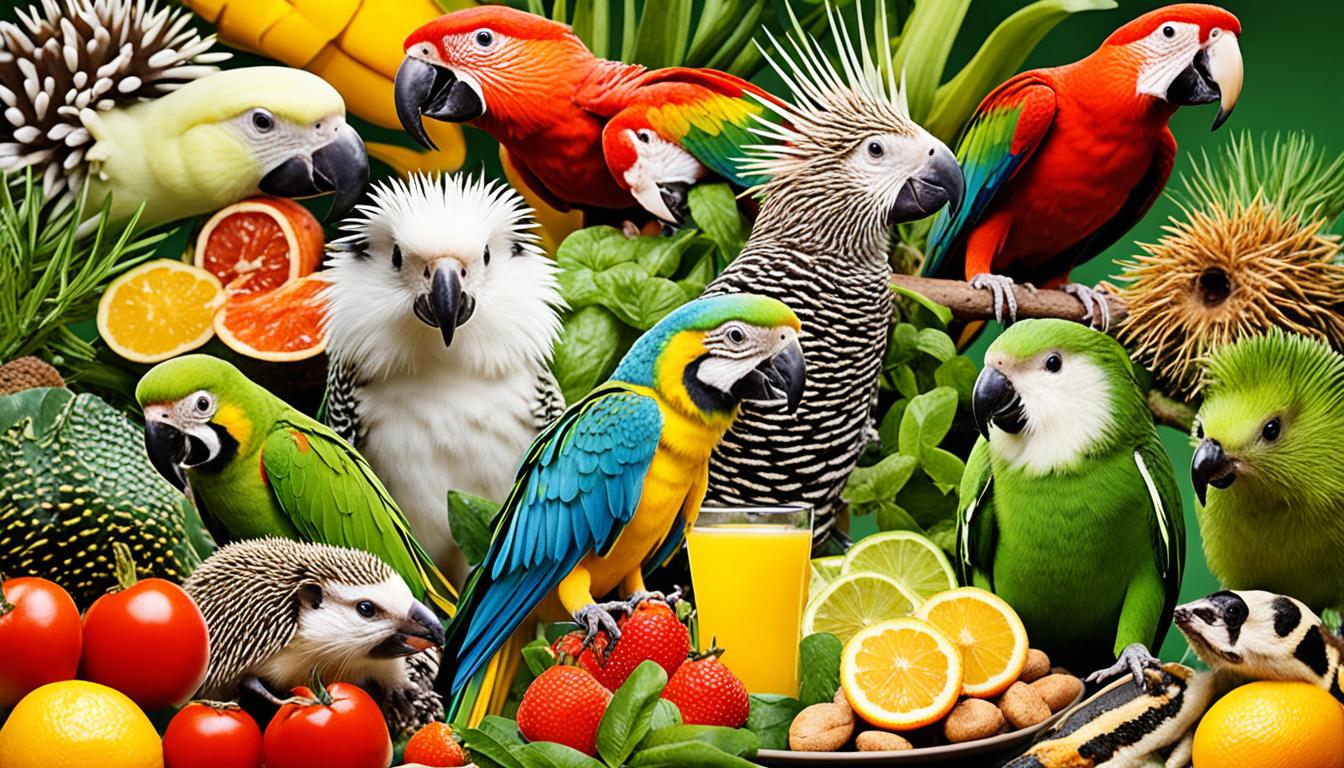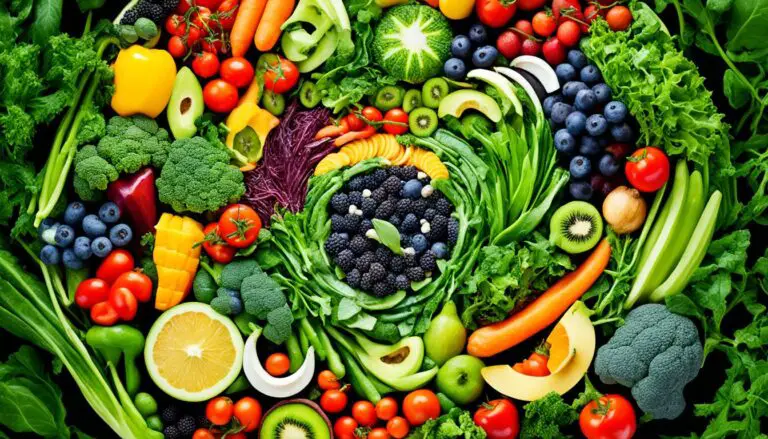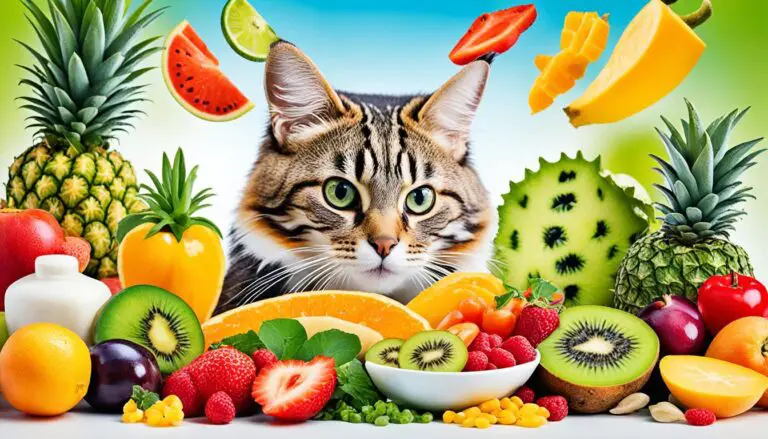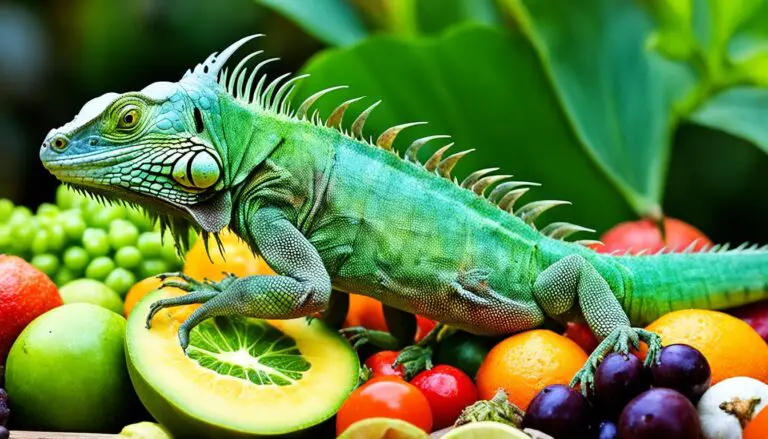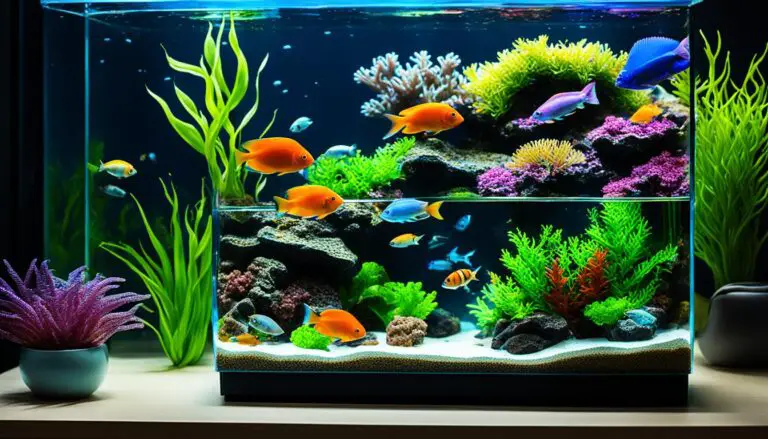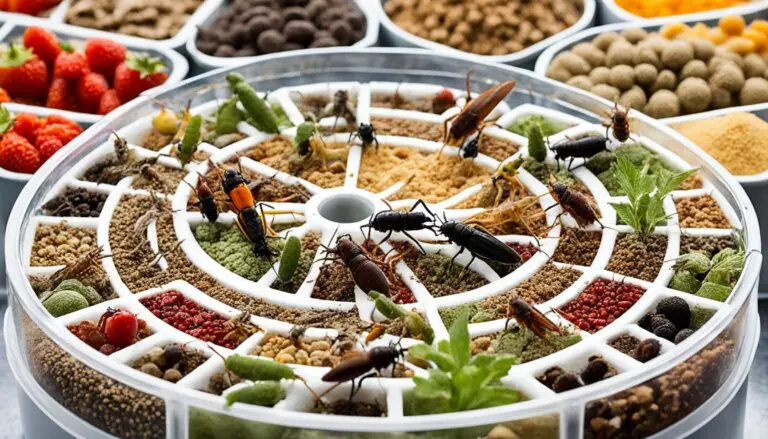Exotic Pet GI Disorders: Nutritional Management
Gastrointestinal disorders are common in exotic pets. Birds, reptiles, and small mammals face these issues. These animals need special care for their digestive health. It’s key for their well-being because their diets are different from regular pets.
Key Takeaways:
- Exotic pets need special diets to manage GI issues.
- Good nutrition is vital for exotic pets’ health and happiness.
- Custom diets help with GI issues in exotic pets.
- It’s important to know what each exotic species needs to eat for good digestion.
- Vets use both healthcare and special diets to treat GI problems in exotic pets.
Types of Gastrointestinal Diets for Exotic Pets
Exotic pets with stomach problems can benefit from special diets. These diets target the needs of each animal type to support better digestion.
Low-Residue Diets
These diets are short on fiber to help food move smoothly through pets’ systems. A good choice for animals with tummy troubles, they cut down on fiber to ease digestion. This means less stress on the stomach and more comfortable digestion.
Fiber-Enhanced Diets
Fiber-rich diets can help pets with sicknesses like diabetes. They come in different types, based on how the fiber acts in the gut. Adjusting this fiber supports the stomach and helps the animal use food better.
Low-Fat Diets
For pets that vomit often or have a pancreas problem, low-fat diets are key. These help cut back on stomach issues and aid in faster digestion. Less fat means a happier, healthier gut.
Hypoallergenic Diets
Hypoallergenic diets lessen food allergy signs in exotic pets. They fall into two main types. Novel protein diets introduce new proteins to reduce allergies. Hydrolyzed diets use specially processed proteins to be more allergy-friendly.
It’s smart to talk with a vet when choosing a gut-health diet for an exotic pet. They can tailor a diet to meet your pet’s specific health needs. This custom plan will boost your pet’s digestion and quality of life.
Nutritional Management of Vomiting in Exotic Pets
Vomiting is often linked to stomach problems in exotic pets. It’s key to feed them diets that are low in fat and easy to digest. These diets help their stomach recover and reduce vomiting.
If a pet is vomiting a lot, you might need to stop giving them food for a day. This break lets the stomach calm down. Then, start feeding them small meals. This helps food move through the stomach better.
Special diets for vomiting animals are easy to digest and gentle. Look for low-fat options. They help the stomach by not making it work too hard.
Always work with a vet who knows about exotic pets for the best care. They will tailor a diet and check how your pet is doing. This customized plan is very important for your pet’s health.
It’s crucial to always talk to a vet about nutrition for your vomiting exotic pet. They will offer advice on food, when to feed, and any needed supplements for a healthy digestive system.
Key Points:
- Vomiting is a common clinical sign of gastric disease in exotic pets.
- Choose a low-fat, low-residue diet to minimize gastric irritation and promote gastric emptying.
- Withhold food for 24 hours in cases of acute, frequent vomiting, followed by small, frequent meals.
- Targeted nutrition for vomiting pets involves selecting easily digestible diets.
- Consult with a veterinarian experienced in exotic pet care for personalized nutritional recommendations.
By choosing the right food, you can really help your exotic pet’s stomach issues. This will boost their health and happiness.

Nutritional Management of Small Intestinal Disease in Exotic Pets
Small intestinal disease is common in exotic pets, often causing diarrhea and sometimes vomiting. It’s key to feed them a proper diet to help their digestive system. This means giving them food that’s easy on the stomach and intestines. This reduces the strain on their already weakened system.
It’s also helpful to feed them small meals frequently. This keeps their stomachs from getting too full at once. So, the body can focus on digesting food well. This way, the digestion and absorption of nutrients improve, and the overall risk of health issues goes down.
For the best results, it’s crucial to get advice from a specialized vet for exotic pets. They can create a diet plan that fits your pet’s specific needs perfectly.

Benefits of Low-Residue Diets for Small Intestinal Disease
A low-residue diet has advantages for exotic pets with small intestinal issues:
- It makes food easier to digest, which is less taxing on the body.
- Eating such food can soothe the stomach, reducing pain and discomfort.
- This kind of diet helps the gut heal by offering gentle nutrients.
- It ensures the body takes in vital nutrients well, keeping the pet healthy.
Each exotic pet is different, with unique dietary needs. A vet will guide you to what’s best for your pet, considering its specific health conditions.
| Dietary Recommendations for Small Intestinal Disease | Benefits |
|---|---|
| Low-Residue Diet | Reduces bulk, minimizes inflammation, supports intestinal lining restoration, and optimizes nutrient absorption. |
| Frequent Small Meals | Minimizes workload on intestines, aids digestion and absorption, reduces the risk of complications. |
| Targeted Nutrition | Customized dietary plan based on individual needs and condition, ensuring optimal nourishment. |
Nutritional Management of Inflammatory Bowel Disease (IBD) in Exotic Pets
Inflammatory Bowel Disease (IBD) affects the stomach and gut in exotic animals. It’s a long-term issue that can make pets feel unwell. The right food can help reduce these effects and make pets healthier. A special diet plan can lower swelling and make pets feel better.
A key step in feeding pets with IBD is to control how much protein they eat. Too much protein might make the body’s defense system overreact, causing more gut problems. That’s why a low-residue diet is a good choice for these animals.
A low-residue diet includes easy-to-digest foods. This kind of food doesn’t stick around in the gut, letting it work less hard. It includes cooked, low-fat meats like chicken, along with foods like rice or potato, and some vegetables.
Dividing meals into smaller, more frequent parts can also benefit these pets. It means their stomach and gut won’t have to work as hard at one time. This can stop the gut from getting stretched, easing digestion and reducing any pain.
Some pets with IBD might react badly to different foods, showing sensitivity or allergies. For them, a special novel protein or hydrolyzed diet may help. These diets use proteins that are new to the pet, meaning they are less likely to cause problems. They can help stop inflammation and keep the gut healthy.
| Nutritional Management of IBD in Exotic Pets | Key Considerations |
|---|---|
| 1. Low-Residue Diet | – Easily digestible foods – Minimal residue in the GI tract – Cooked lean meats, digestible carbs, and well-cooked vegetables |
| 2. Small, Frequent Meals | – Prevent excessive stretching of the GI tract – Promote smoother digestion |
| 3. Novel Protein or Hydrolyzed Diet | – Reduce allergic responses – Minimize inflammation |
Helping pets with IBD eat the right food involves knowing their special needs. A vet who works with exotic animals can make a plan just for them. With the right food and good medical care, pets with IBD can lead a healthier life.

Nutritional Management of Protein Losing Enteropathies (PLE) in Exotic Pets
Lymphangiectasia, part of protein losing enteropathies (PLE), needs a special diet. This diet aims to lessen protein leaking and keep exotic pets healthy.
Low-Fat High-Protein Diets
A diet low in fat and high in protein is best for PLE. It reduces stress on the pancreas and is easy on the stomach. The high protein boosts amino acids and meets nutritional needs.
Low-Residue Hypoallergenic Diets
For pets with PLE, a low-residue diet is key. It eases digestion and is gentle on the gut. These diets, with less fiber, help food move smoothly. Hypoallergenic aspects reduce potential allergens, aiding digestive health.
“A carefully tailored diet that takes into account the unique needs of pets with lymphangiectasia can significantly enhance their overall well-being and quality of life.” – Dr. Lisa Baker, exotic pet nutrition expert
Special diets like low-fat, high-protein, and low-residue support PLE management. Along with a veterinarian, pet owners should tailor these diets to the specific animal. They also consider the pet’s species and personal needs.

Nutritional Management of Dysbiosis in Exotic Pets
Dysbiosis in exotic pets can cause diarrhea. It’s important to use the right diet to make their intestines healthy again. A vet can help create a nutrition plan that fixes this issue and keeps your pet’s stomach well.
Low-Residue/Fiber-Enhanced Diets
A diet low in fiber is good for pets with dysbiosis. These diets regulate bathroom habits and help the good bacteria grow. They take it easy on the stomach, letting it heal without much work.
Probiotics and Prebiotics
Feeding pets probiotics and prebiotics does a lot of good for their stomachs. Probiotics are tiny live things that help balance the gut’s bacteria. Prebiotics are their food, making them stronger and keeping the gut healthy.
Antimicrobial Therapies
Sometimes, using drugs that kill bad bacteria is needed. These drugs reduce the harmful bacteria, helping the good ones thrive. With a vet’s advice, you can find the right treatment that’s safe for your pet.
Using the right food, probiotics, and sometimes medicine can fix your pet’s stomach. This approach can make their gut healthy again.
Creating a diet that fits your exotic pet’s needs is crucial. A vet’s advice can help you make the best choices for your pet. They can guide you to a plan that keeps your pet healthy for a long time.
Nutritional Management of Pancreatic Disease in Exotic Pets
Pancreatic disease in exotic pets, like acute and chronic pancreatitis, needs special care with food. The pancreas helps digest food by making enzymes. When it’s hurt or not working well, the right food is very important. This helps the pancreas heal and stops it from working too hard.
Eating low-fat food is a big part of managing pancreatic disease. These meals are easier for the pancreas to handle because fats can make it produce more enzymes. Such diets can ease the symptoms and lower the pancreas’s swelling. This helps the body recover.
Exocrine pancreatic insufficiency (EPI) is another issue that can come up. It means the pancreas doesn’t make enough enzymes to digest food. Pets with EPI need extra enzymes to digest their meals right. They might also need a special diet. This diet helps them absorb important vitamins better because their body has trouble doing this on its own.
Overall, choosing the right food is key in treating and helping pets recover from pancreatic disease. Low-fat diets keep the pancreas from overworking and help it heal. For pets with EPI, adding enzymes to their food is crucial to digest food properly. Working with a vet to craft a special food plan can really improve a pet’s health.
Recommended Nutritional Strategies for Pancreatic Disease in Exotic Pets
| Condition | Nutritional Strategy |
|---|---|
| Acute and chronic pancreatitis | Low-fat diet to reduce pancreatic stimulation and inflammation |
| Exocrine pancreatic insufficiency (EPI) | Supplementation with pancreatic enzymes and tailored diet to support fat-soluble vitamin absorption |
Nutritional Management of Large Intestinal Disorders in Exotic Pets
Proper nutrition is key in handling colitis and other large bowel issues in exotic pets. A mainstay in their diet should be high-fiber foods. These foods help by boosting good gut bacteria and maintaining proper bowel hydration. A high-fiber diet keeps the digestive system of exotic pets healthy.
Colitis is when the colon gets inflamed, and it’s a frequent issue in exotic pets. Signs include diarrhea, belly aches, and weight loss. Feeding pets a lot of fiber from fruits, veggies, and grains can ease these symptoms. Such foods help good bacteria in the gut, improving how nutrients are used by the body.
Sometimes, a high-fiber diet doesn’t stop diarrhea in exotic pets. Then, a different approach might be needed. A diet that’s gentle on the gut could be the answer. This kind of diet lowers the plant matter in the colon or cuts out allergens that can cause more gut pain. It’s a good choice for pets with bad diarrhea or those that don’t do well on high-fiber meals.
Benefits of High-Fiber Diets for Colitis in Exotic Pets:
- Promote the growth of beneficial bacteria in the colon
- Improve water balance in the colon
- Aid in the digestion and absorption of nutrients
- Reduce colonic inflammation
When to Consider a Low-Residue or Low-Allergen Diet:
Pets with severe large bowel diarrhea or no improvement with high-fiber diets might benefit from these special diets. They lessen leftover plant foods and cuts out triggers that heighten gut inflammation.
Summing it up, managing colitis and other bowel issues in exotic pets is vital. While high-fiber diets are commonly recommended, if they don’t work, other diets are available. Each pet’s diet should be tailored to meet their special needs. This way, we can do the best for exotic pets’ health and digestion.
Nutritional Considerations for Overall Gastrointestinal Health in Exotic Pets
Nutrition is key for exotic pets’ gut health. Their diets must be just right to prevent tummy troubles. Each species needs a special diet to stay healthy.
It’s vital to feed exotic pets the right foods. This keeps their stomachs working well. A perfect diet gives them all they need for good health and helps their tummy stay in top shape.
Exotic pets need special diets because they’re not like dogs or cats. The foods they eat must fit their unique stomachs. This keeps them from getting sick and makes sure they’re as healthy as can be.
Benefits of Balanced Diets for Exotic Pets
Eating the right foods does wonders for an exotic pet. It helps them grow, keeps them at a good weight, and boosts their immune system. This way, they stay happy and healthy.
“A healthy diet is crucial for an exotic pet’s tummy. It helps them digest well and keeps their gut happy.”
Tailored Nutrition for Exotic Species
Every exotic pet has special food needs. Creating a diet means looking at what they would eat in the wild. It also considers how their body works and what they need to be healthy.
For herbivores like rabbits, fiber is a must for them to digest food well. But, a snake needs lots of proteins because they eat meat. Knowing what to feed different pets is crucial for their health.
Some pets might have sensitive stomachs or health issues. A vet who knows about exotic pets can help. They ensure these pets get the right food, even if they have special needs.
Conclusion
Nutritional management is vital for the health of exotic pets with stomach issues. It’s key to know what each type of pet should eat. This way pet owners and vets can improve the pet’s gut health and their life quality.
Feeding the right food can help lessen symptoms in exotic pets with tummy problems. For example, a special diet might be needed for small or big gut diseases. By feeding them what they need, you are taking care of their specific stomach needs.
But, looking after the diet is not the only thing you should do for these pets. They also need to see the vet often, take their medicine, and have their health checked. A good care plan includes the right food and regular vet check-ups. Together, these steps ensure the best for your pet’s stomach and overall health.
FAQ
What types of gastrointestinal diets are available for exotic pets?
How should vomiting in exotic pets be managed nutritionally?
What type of diet is recommended for small intestinal disease in exotic pets?
How can nutritional management help with Inflammatory Bowel Disease (IBD) in exotic pets?
What type of diet is suitable for exotic pets with Protein Losing Enteropathies (PLE)?
How can dysbiosis in exotic pets be managed through nutrition?
What is the recommended nutritional management for pancreatic disease in exotic pets?
What type of diet is recommended for exotic pets with large intestinal disorders?
How can overall gastrointestinal health in exotic pets be maintained through nutrition?
Source Links
- https://www.isvma.org/wp-content/uploads/2022/10/BonAppetitNutritionalConsiderationsforExoticPets.pdf
- https://www.ncbi.nlm.nih.gov/pmc/articles/PMC7106034/
- https://todaysveterinarypractice.com/nutrition/gastrointestinal-disease-diets-dogs-cats/
Peter Stones is the founder of Exotic Pets Place, the leading online resource for exotic pet care information.
With over 10 years of hands-on exotic pet ownership experience, he is deeply passionate about sharing his expertise to help others properly care for their unusual pets.
When he's not writing extensively researched articles or connecting with fellow exotic pet enthusiasts worldwide, you can find Peter at home tending to his own beloved menagerie of exotic animals.

